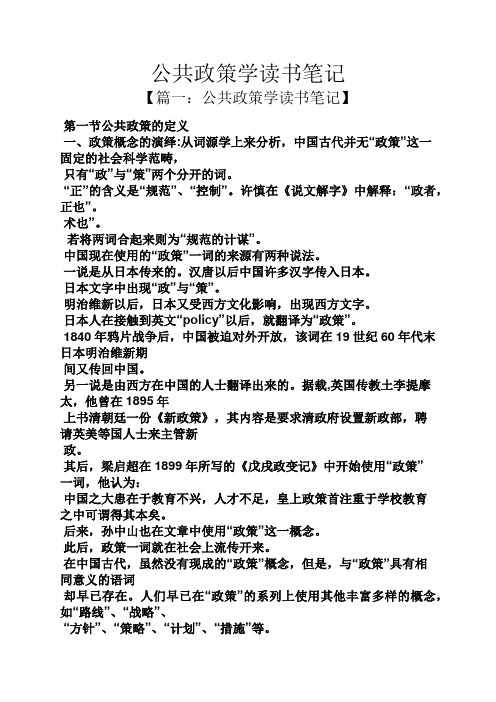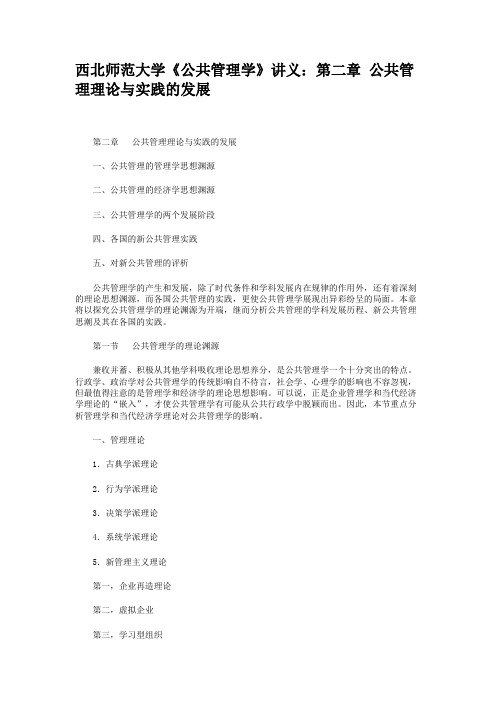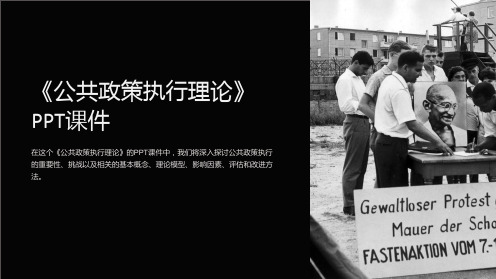第2章有关公共政策的各种理论
公共政策学读书笔记

公共政策学读书笔记【篇一:公共政策学读书笔记】第一节公共政策的定义一、政策概念的演绎:从词源学上来分析,中国古代并无“政策”这一固定的社会科学范畴,只有“政”与“策”两个分开的词。
“正”的含义是“规范”、“控制”。
许慎在《说文解字》中解释:“政者,正也”。
术也”。
若将两词合起来则为“规范的计谋”。
中国现在使用的“政策”一词的来源有两种说法。
一说是从日本传来的。
汉唐以后中国许多汉字传入日本。
日本文字中出现“政”与“策”。
明治维新以后,日本又受西方文化影响,出现西方文字。
日本人在接触到英文“policy”以后,就翻译为“政策”。
1840年鸦片战争后,中国被迫对外开放,该词在19世纪60年代末日本明治维新期间又传回中国。
另一说是由西方在中国的人士翻译出来的。
据载,英国传教土李提摩太,他曾在1895年上书清朝廷一份《新政策》,其内容是要求清政府设置新政部,聘请英美等国人士来主管新政。
其后,梁启超在1899年所写的《戊戌政变记》中开始使用“政策”一词,他认为:中国之大患在于教育不兴,人才不足,皇上政策首注重于学校教育之中可谓得其本矣。
后来,孙中山也在文章中使用“政策”这一概念。
此后,政策一词就在社会上流传开来。
在中国古代,虽然没有现成的“政策”概念,但是,与“政策”具有相同意义的语词却早已存在。
人们早已在“政策”的系列上使用其他丰富多样的概念,如“路线”、“战略”、“方针”、“策略”、“计划”、“措施”等。
可以将“路线”、战略”看作是“总政策”;将“政策”、“方针”看作是“基本政策”;将“策略”、“计划”、“措施”看作是“具体政策”。
在当代汉语中,人们在使用“政策”一词时,在多数情况下也是将“政策”与“公共政策”通用,讲“政策”时多指“公共政策”。
如《辞海》中,“政策”被解释为“党和国家为实现一定时期的路线而制定的行动准则”。
因此,中国的公共政策研究者的一个重要任务,是要将中国历史上大量的有关上“规范的计谋”的知识、理论与方法同现代的公共政策结合起来。
《公共政策学--政策分析的理论、方法和技术》重点解析

《公共政策学--政策分析的理论、方法和技术》陈振明公共政策学:一个综合运用各种知识和方法来研究政策系统和政策过程,探求公共政策的实质、原因和结果的学科,其目的是提供政策相关知识,改善公共决策系统,提高公共政策质量。
第一章绪论第一节公共政策、政策系统和政策过程1、公共政策★★★公共政策:国家(政府)、执政党及其他政治团体在特定时期为实现一定的社会政治、经济和文化目标所采取的政治行动或所规定的行为准则,它是一系列谋略、法令、措施、办法、方法、条例等的总称。
2、政策系统★★★★(1)政策系统:由政策主体、政策客体及其政策环境相互作用而构成的社会政治系统。
①政策主体:指直接或间接参与政策制定、执行、评估和监控的个人、团体或组织。
一般包括立法机关、行政机关、司法机关、政党、利益团体、思想库、大众传媒和公民。
②政策客体:指政策所发生作用的对象,包括政策所处理的社会问题(事)和政策所发生作用的社会成员(人)。
③政策环境:指影响政策产生、存在和发展的一切因素的总和。
包括自然环境和社会环境,社会环境涵盖了社会经济状况、体制或制度条件、政治文化和国际环境。
(2)政策系统的划分:①信息子系统:由掌握信息技术的专门人才所组成,从事信息的收集、整理、储存和传递等活动,为公共决策提供信息资料。
②咨询子系统:由思想库以及各种专家、学者所组成,为公共决策提供方案或其他咨询服务。
③决断子系统:由拥有决策权力的高层领导者所组成,领导公共决策活动的全过程。
④执行子系统:由政策执行组织及其人员特别是政府行政机关和行政人员所构成,将政策方案转换成政策效果。
⑤监控子系统:体制内和体制外的有关部门、单位和个人所组成的一个子系统,相对独立于其他子系统之外。
(3)我国公共政策系统运行的优化①公共决策的科学化:决策科学化是现代公共决策的主导,指决策者及其参与者充分利用现代化科学技术、知识及方法,特别是公共决策的理论和方法来进行决策,并采用科学合理的基础程序进行决策。
西北师范大学《公共管理学》讲义:第二章 公共管理理论与实践讲解

西北师范大学《公共管理学》讲义:第二章公共管理理论与实践的发展第二章公共管理理论与实践的发展一、公共管理的管理学思想渊源二、公共管理的经济学思想渊源三、公共管理学的两个发展阶段四、各国的新公共管理实践五、对新公共管理的评析公共管理学的产生和发展,除了时代条件和学科发展内在规律的作用外,还有着深刻的理论思想渊源,而各国公共管理的实践,更使公共管理学展现出异彩纷呈的局面。
本章将以探究公共管理学的理论渊源为开端,继而分析公共管理的学科发展历程、新公共管理思潮及其在各国的实践。
第一节公共管理学的理论渊源兼收并蓄、积极从其他学科吸收理论思想养分,是公共管理学一个十分突出的特点。
行政学、政治学对公共管理学的传统影响自不待言,社会学、心理学的影响也不容忽视,但最值得注意的是管理学和经济学的理论思想影响。
可以说,正是企业管理学和当代经济学理论的“嵌入”,才使公共管理学有可能从公共行政学中脱颖而出。
因此,本节重点分析管理学和当代经济学理论对公共管理学的影响。
一、管理理论1.古典学派理论2.行为学派理论3.决策学派理论4.系统学派理论5.新管理主义理论第一,企业再造理论第二,虚拟企业第三,学习型组织二、当代经济学理论1.公共选择理论2.政府失败论第一,公共决策失效。
第二,政府工作机构的低效率。
3.代理理论和交易费用理论(1)代理理论(2)交易费用理论第二节公共管理学科的发展历程公共管理的有关实践和具体研究都有很长的历史。
但是,作为一门独立学科,它的历史并不长。
1887年以前,公共管理仅处于前学科时期,公共管理特别是行政学长期附属在政治学之中,并没有独立出来。
以1887年伍德罗威尔逊的《行政学研究》一文的发表为标志,公共管理研究进入学科前期——行政学阶段。
从那时候算起,公共管理学至今也只有100多年的历史。
对于这段历史,有关学者从不同的视角、运用不同的方法进行了划分和描述。
一部分学者从理论视角人手对公共管理学作了划分。
公共政策的理论与方法

公共政策的理论与方法公共政策,这个在我们日常生活中无处不在却又常常被忽视的存在,对社会的运行和发展起着至关重要的作用。
从教育改革到医疗保障,从环境保护到经济调控,公共政策的影响渗透到了社会的方方面面。
那么,究竟什么是公共政策?它又有着怎样的理论基础和实施方法呢?公共政策可以被简单地理解为政府为解决公共问题、实现公共利益而制定的行动方案和准则。
它是政府管理社会的重要手段,通过对资源的分配和社会行为的规范,来达到预期的目标。
在公共政策的理论领域,存在着多种不同的观点和流派。
其中,理性决策理论认为,政策制定者在决策过程中应当遵循理性的原则,全面收集信息,对各种可能的方案进行评估和比较,选择最优的方案。
这种理论强调了决策的科学性和逻辑性,但在现实中,由于信息的不完全、人的认知有限以及时间和资源的限制,完全的理性决策往往难以实现。
渐进决策理论则认为,政策制定通常是在过去政策的基础上进行逐步的调整和改进。
这种理论更符合现实中政策制定的实际情况,因为政策的变革往往是渐进的,需要考虑到社会的接受程度和政策的连续性。
此外,还有团体决策理论,它强调各种利益团体在政策制定过程中的作用。
利益团体通过游说、施压等方式,影响政策的走向,以实现自身的利益诉求。
公共政策的制定过程是一个复杂而又系统的过程。
首先,需要进行问题的界定。
明确存在的问题是什么,问题的性质和范围如何,这是制定有效政策的前提。
然后,要进行目标的设定,确定政策希望达到的效果和目标。
在这个过程中,需要充分考虑社会的需求、政府的能力以及各种约束条件。
接下来是方案的设计和选择。
政策制定者需要集思广益,设计出多种可能的解决方案,并通过评估和比较,选择最可行的方案。
这其中,需要运用各种分析方法和技术,如成本效益分析、风险评估等。
政策的执行是将政策方案转化为实际行动的过程。
在执行过程中,需要建立有效的执行机构,明确各部门的职责和任务,同时要加强对执行过程的监督和控制,及时发现和解决问题,确保政策能够得到有效的落实。
《公共政策执行理论》课件

4 外部环境
社会、经济等外部环境因素会影响政策执行 的结果。
5 监督机制
有效的监督机制可以确保政策执行的公正性 和效果。
公共政策执行的评估和改进
政策执行的评估方法
绩效评估、成本收益分析和社会影响评估等方法可 用于评估政策执行效果。
政策执行的改进途径
调整政策设计、完善制度环境、提高实施者素质以 及建立有效监督机制,可以改进政策执行。
结语
公共政策执行的现状与未来
我们将对公共政策执行的现状进行分析,并展望未 来的发展方向。
政策执行者的职责与使命
作为政策执行者,我们应该承担起责任,为社会发 展做出贡献。
公共政策执行定义
公共政策执行是将制定的政 策转化为实际行动的过程。
公共政策执行的主体
政府、市场和社会组织在公 共政策执行中扮演着重要角 色。
公共政策执行的环节
实施者、监管者和受托者共 同构成了公共政策执行的环 节。
公共政策执行的理论模型
1
ห้องสมุดไป่ตู้
“铁三角”模型
政府、利益团体和行业代表之间的相互制约和合作。
《公共政策执行理论》 PPT课件
在这个《公共政策执行理论》的PPT课件中,我们将深入探讨公共政策执行 的重要性、挑战以及相关的基本概念、理论模型、影响因素、评估和改进方 法。
引言
公共政策执行对社会发展至关重要,同时也面临着各种挑战。在这一部分,我们将介绍其重要性以及面临的挑 战。
公共政策执行的基本概念
2
利益博弈模型
不同利益相关方之间的权力和利益博弈。
3
实施网络模型
各个部门、社会组织和企业之间的复杂网络关系。
公共政策执行的影响因素
1 制度环境
电大《公共政策概论》期末复习各章重点问题部分

各章重点问题提示第一章导论一、中外学者对公共政策的界定1、伍德罗·威尔逊认为,公共政策是由政治家,即具有立法权者制定的,由行政人员执行的法律和法规。
2、戴维·伊斯顿认为,公共政策是对全社会的价值作有权威的分配。
3、拉斯韦尔与卡普兰认为,公共政策是一种具有目标、价值与策略的大型计划。
4、托马斯·戴伊认为,凡是政府决定做的或者不做的事情就是公共政策。
5、国内学者张金马认为,公共政策是政党和政府用以规范、引导有关机构团体和个人行动的准则或指南。
其表现形式有法律规章、行政命令、政府首脑的书面或口头声明和指示、行动计划与策略等。
二、对全社会的利益作权威性分配1、对戴维·伊斯顿定义的分析美国学者戴维·伊斯顿认为,公共政策是对全社会的价值作有权威的分配。
这一界定突出了三个思想,即:制定公共政策是为了价值分配;分配的范围是全社会;分配的影响力是权威性的。
我们认为,为免于对“价值”一词有宽泛的基本掌握,同时又能突出公共政策的本质,不如把“价值”改为“利益”。
公共政策的本质是社会利益的集中反映。
政策的形成过程,实际上是各种利益群体把自己的利益要求输入到政策制定系统中,由政策主体依据自身利益的需求,对复杂的利益关系进行调整的过程。
具体地说,政府利用公共政策,去保护、满足一部分人的利益需求,同时抑制、削弱甚至打击另一部分人的利益需求。
通过政策作用去调整利益关系,在原有利益格局的基础上形成新的利益结构。
正是从这个意义上讲,公共政策的本质应该是政府对社会实行权威性的利益分配。
这也是我们前面主张的,可以在戴维·伊斯顿对公共政策的定义中,把“价值分配”改为“利益分配”的理由。
2、利益分配的动态性与戴维·伊斯顿的定义不同的另一点是,我们认为公共政策的功能绝不仅限于分配上。
政府分配利益是一个动态过程,分配的基础是政府选择利益和综合利益;分配的关键是落实利益。
从社会公共利益中,由利益选择到利益综合,由利益分配到利益落实,这是一个完整的过程。
公共政策名词解释

一、名解:第一章:1、公共政策是政府依据特定时期的目标,在对社会公共利益进行选择、综合、分配和落实的过程中所制定的行为准则。
第二章:1、公共政策主体是指参与、影响公共政策全过程,对公共政策有直接或者间接的决定作用的组织或个人。
因为公共管理的目标是有效地维护与增进并公平分配社会公共利益,所以,公共政策主体应该包括政府主体、准公共政策主体和社会公众。
2、准公共政策主体:政府主体以外的公共政策主体统称为准公共政策主体,即“社会中那些为追求公共利益与服务的非政府公共组织”,也可称之为第三部门,如非政府组织NGO、非营利组织NPO等社会组织和社会主体。
准政策主体在整个公共政策体系中仅处于从属性和辅助性的地位。
3、公众参与与公共政策:公众(公民或选民)是公共政策主体的一个重要的组成部分,虽然没有明确的组织,力量也比较分散,但却是一种最广泛的非官方政策主体。
公众通过各种政治参与途径,影响或制约政府的公共政策的制定和执行。
4、政策主体能力的含义与内容:政策主体能力是各政策主体的能力与整个公共政策体系内部的互动及整合能力的综合体。
从整体上来说,公共政策主体的能力主要包括:(一)规制社会成员行为的能力;(二)引导公众观念,行为的能力;(三)调控各种利益关系的能力;(四)公平分配社会资源的能力;(五)公共政策体系内部的互动及综合能力。
在整个公共政策体系中,各子系统、各组成部分之间的互动及综合能力也是公共政策主体能力的重要组成部分。
第三章:1、决策权力:可以定义为一种法律权力,它或者是在一系列可能行动中做出选择的权力,或者是影响政策主体、推动他去选择自己所偏好的某一行动的权力。
在组织中,决策权力的基础主要是正式的职权和非正式权力或二者的结合。
2、公共决策体制,是指担负着公共决策任务的机构和人员所组成的组织体系以及制定政策的基本程序和制度。
第四章:1、决策方案的评估就是对已经设计出并且被列为选择对象的决策方案的可行性和利弊得失,进行深人的讨论研究和分析,给予系统的、科学的评估,为选择方案提供科学依据。
公共政策概论第二章

理论与政策的关系
完美的理论,一旦落实在政策上就有可怕的后果,是否“理论就不完美?” 不完美得理论一旦落实在政策上就会导致适当的结果,是否“理论就是完美的”? 完美的理论、可怕的政策 阶级分析理论非常完美 ——运用这种理论制定的政策却非常可怕:把所有的人都分成不同的阶级,并对其进 行区别对待。 人性恶的理论,也似乎非常完美 ——运用这种理论制定的政策也非常可怕:把人看成是恶的,人越恶,越有利于历史 发展
2004年3月21日,长春市宣布:对进该城市的农民 工子女,由各城区教育行政部门本着就地就近原则, 负责安置入学,所交费用与城市居民子女相同。同 时,市政府废止原“对农民工子女收取非本学区学 生学费”的规定。 长春市副市长崔杰:农民工在所在城市纳税,有权 享受国民待遇。在农民工所缴纳税款中,已包含教 育行政事业性收费,因此不应让农民工再额外承担 不合理的教育支出。
不完美的理论、适当的政策
男女平等理论、男女不平等理论:完美吗? 男女在生理、能力、习惯、文化等各个方面都有很大的差异;也有很多类似的地 方 有些公共政策需要男女有别:征兵,即使需要女兵,也很难完全实现男女完全一 样 绝大多数公共政策不能以男女有别为基础,否则对女性的歧视将越来越制度化。
人=吃饭+睡觉+上班+玩 猪=吃饭+睡觉 代入:人=猪+上班+玩 即:人-玩=猪+上班 结论:不懂玩的人=会上班的猪
你是否同意开征房产税? 她(他)为什么不再爱我了? 地板黄色好还是褐色好看? 是否应该严格限制第二套房的贷款比例?
你为什么爱我? 需要理由吗? 不需要吗? 需要理由吗? 不需要吗? …… 崩溃中~~
非官方参与者
- 1、下载文档前请自行甄别文档内容的完整性,平台不提供额外的编辑、内容补充、找答案等附加服务。
- 2、"仅部分预览"的文档,不可在线预览部分如存在完整性等问题,可反馈申请退款(可完整预览的文档不适用该条件!)。
- 3、如文档侵犯您的权益,请联系客服反馈,我们会尽快为您处理(人工客服工作时间:9:00-18:30)。
3.1 新制度主义 Neo-Institutionalism
Definition of institution —— Robert Keohane Persistent and connected sets of rules (formal or informal) that prescribe behavioral roles , constrain activity , and shape expectations
•
市场与官僚科层制
市 场:信息与服务成本的外部化——费用分摊 官僚制:信息与服务成本的内部化——无偿提供
3.3 制度的自主性
制度一旦成型,即高于个人,独立于个 人,影响个人 政治制度与社会、历史环境相互独立 过去影响未来:历史积淀而成的制度框 架与规范制约未来的选择(路径依赖) “非正式”维度的影响:符号、象征、 含义、惯例、仪式、文化等等制约个人 的行为选择
2.1 公共选择理论 Public Choice
Chief Assumption—
•
•
Political actors , like economic ones , act rationally to maximize the utility (satisfaction) Only political actor that counts is the individual .
1. 帕累托最优在公共领域中的不可能性 It is impossible to apply in the public policy arena because all government actions make some better off at the expense of others. 2. 卡尔多标准( Kaldor criterion ) A policy can be chosen even if some lose as long as the total gains are higher than the sum of loses.
3.2 制度的存在理由 与好的制度
交易成本 transaction cost institutions of various kinds are significant to the extent that they increase or lower the costs of transaction
2.3 公共选择的主要领地
Domain of Public Choice
选举行为 政治体制与经济体制的关系 个人决策行为与集合决策行为的特性 政府的结构与制度 (官僚机构、立法机 构、政党、宪政)
2.4 典型的公共选择分析
Typical logic of public choice
2.6 公共选择理论的优点 Advantages
理论简洁
逻辑精美
数学运用
2.7 公共选择理论的缺陷 Disadvantages
Over-simplification Poor predictive capacity Limitation to two-party system Disregard of non-democratic system Underestimation of institution Explicitly normative
Once it is agree that a problem requires state intervention the key public policy question for welfare economists is to find the most efficient way of doing so. 2. 帕累托最优 ( Pareto Optimality ) The criterion of Pareto Optimality requires that an action be undertaken only if it offers the possibility of making at least one person better off without worsening the situation of any other person.
4.2 市场失败的主要类型 (The core type of market failures)
1. Natural Monopoly 2. Imperfect Information 3. Externalities 4. The Tragedy of the Commons 5. Destructive Competition
3.6 新制度主义的缺点 Main problems
对于制度的起源无法提出合理而严谨的 解释,只能求助于功能主义 无法说明制度会推动决策者和政策朝哪 个方向发展
4.1 福利经济学 (Welfare Economics)
1.
Basic notion: Individuals, through market mechanisms, should be relied upon to make most social decisions. 2. Basic observation Market cannot always distribute resources efficiently or cannot aggregate individual utilitymaximizing behavior so as to optimize overall social welfare.
三种行为者:选民、政客、官僚 行为者的功利最大化模式 选民投票支持最能给自己带来利益的政党和政客 政客和政党以最吸引选民的政策承诺换取选票和权 力 官僚争取本部门的预算最大化,以及个人的薪酬、 地位、权力、形象、声望 合成的后果 国家对经济与社会的干预持续扩大 政府规模的扩张
2.5 政策涵义
4.10 市场失败的重新概念化
(Re-conceptualization of Market Failures)
穷尽性 排 他 性
高 低
收费物品
公共物品
高
低
私人物品
公共池塘物品
4.11 福利经济学的政策涵义
私人物品领域 政府不应干预 公共物品领域 政府应有作为 收费物品领域 政府保证使用者付费 公共池塘物品领域 政府建立产权规则
4.9 政府失败 Government Failures
1. Organization displacement 2. Rising costs 3. Derived externalities Conclusion: Not only must government examine market failures, they must also evaluate their own capacity to correct the failures before attempting to do so.
4.12 主要问题 Main Problem
政策的技术制定与政治制定
The theorists almost never make their policies in the essentially technical manner assumed by the theory. It‟s neglect of political variables has led it‟s critics to describe it as „a myth, a theoretical illusion‟ which promotes a „ false and naïve view of the policy process‟.
3.4 制度的作用与功能 ——对于政策分析的涵义
制度可以约束、影响、塑造:
• • • • •
问题的解释 可能的方案 方案的选择 执行的力度和方式 个人、集团、阶级及至国家的期望和期望的实 现
3.5 新制度主义的优点 Main attraction
Neo-Institutionalism directs attention to a range of international and domestic factors that may be relevant to explaining policies without presuming in advance that any one set of factors is more important , leaving that to be revealed through empirical research . Here lies the theory‟s main attraction .
Policy Implication of public choice
公共领域中的集合选择陷入“囚犯困境” 只在最低限度承认政府干预 (P.21) 理论与实践的挑战:政治秩序 political order
The challenge to us is one of constructing , or reconstructing , a political order that will channel the self-serving behavior of participants towards the common good in a manner that comes as close as possible to that described for us by Adams Smith with respect to the economic order —— James Buchanan
